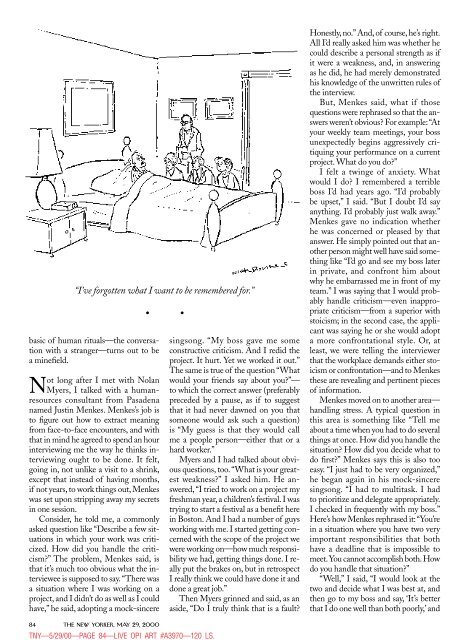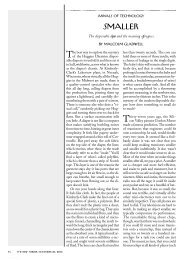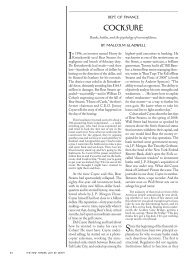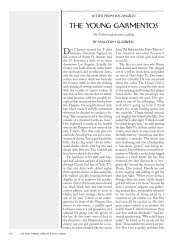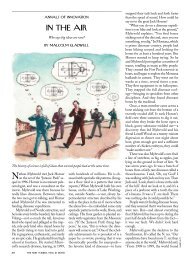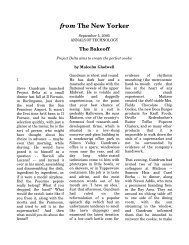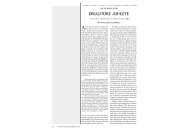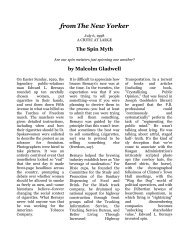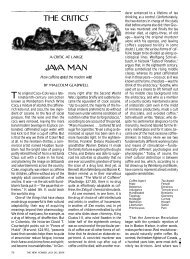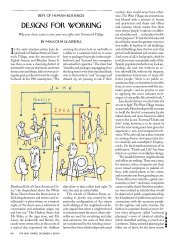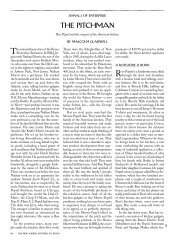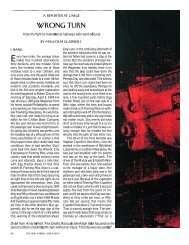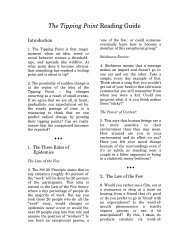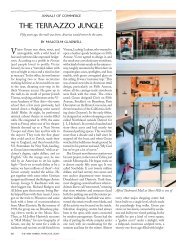The New-Boy Network - Malcolm Gladwell
The New-Boy Network - Malcolm Gladwell
The New-Boy Network - Malcolm Gladwell
You also want an ePaper? Increase the reach of your titles
YUMPU automatically turns print PDFs into web optimized ePapers that Google loves.
“I’ve forgotten what I want to be remembered for.”<br />
basic of human rituals—the conversation<br />
with a stranger—turns out to be<br />
a minefield.<br />
Not long after I met with Nolan<br />
Myers, I talked with a humanresources<br />
consultant from Pasadena<br />
named Justin Menkes. Menkes’s job is<br />
to figure out how to extract meaning<br />
from face-to-face encounters, and with<br />
that in mind he agreed to spend an hour<br />
interviewing me the way he thinks interviewing<br />
ought to be done. It felt,<br />
going in, not unlike a visit to a shrink,<br />
except that instead of having months,<br />
if not years, to work things out, Menkes<br />
was set upon stripping away my secrets<br />
in one session.<br />
Consider, he told me, a commonly<br />
asked question like “Describe a few situations<br />
in which your work was criticized.<br />
How did you handle the criticism?”<br />
<strong>The</strong> problem, Menkes said, is<br />
that it’s much too obvious what the interviewee<br />
is supposed to say. “<strong>The</strong>re was<br />
a situation where I was working on a<br />
project, and I didn’t do as well as I could<br />
have,” he said, adopting a mock-sincere<br />
84 THE NEW YORKER, MAY 29, 2000<br />
• •<br />
TNY—5/29/00—PAGE 84—LIVE OPI ART #A3970—120 LS.<br />
singsong. “My boss gave me some<br />
constructive criticism. And I redid the<br />
project. It hurt. Yet we worked it out.”<br />
<strong>The</strong> same is true of the question “What<br />
would your friends say about you?”—<br />
to which the correct answer (preferably<br />
preceded by a pause, as if to suggest<br />
that it had never dawned on you that<br />
someone would ask such a question)<br />
is “My guess is that they would call<br />
me a people person—either that or a<br />
hard worker.”<br />
Myers and I had talked about obvious<br />
questions, too.“What is your greatest<br />
weakness?” I asked him. He answered,<br />
“I tried to work on a project my<br />
freshman year, a children’s festival. I was<br />
trying to start a festival as a benefit here<br />
in Boston. And I had a number of guys<br />
working with me. I started getting concerned<br />
with the scope of the project we<br />
were working on—how much responsibility<br />
we had, getting things done. I really<br />
put the brakes on, but in retrospect<br />
I really think we could have done it and<br />
done a great job.”<br />
<strong>The</strong>n Myers grinned and said, as an<br />
aside, “Do I truly think that is a fault?<br />
Honestly, no.” And, of course, he’s right.<br />
All I’d really asked him was whether he<br />
could describe a personal strength as if<br />
it were a weakness, and, in answering<br />
as he did, he had merely demonstrated<br />
his knowledge of the unwritten rules of<br />
the interview.<br />
But, Menkes said, what if those<br />
questions were rephrased so that the answers<br />
weren’t obvious? For example:“At<br />
your weekly team meetings, your boss<br />
unexpectedly begins aggressively critiquing<br />
your performance on a current<br />
project. What do you do?”<br />
I felt a twinge of anxiety. What<br />
would I do? I remembered a terrible<br />
boss I’d had years ago. “I’d probably<br />
be upset,” I said. “But I doubt I’d say<br />
anything. I’d probably just walk away.”<br />
Menkes gave no indication whether<br />
he was concerned or pleased by that<br />
answer. He simply pointed out that another<br />
person might well have said something<br />
like “I’d go and see my boss later<br />
in private, and confront him about<br />
why he embarrassed me in front of my<br />
team.” I was saying that I would probably<br />
handle criticism—even inappropriate<br />
criticism—from a superior with<br />
stoicism; in the second case, the applicant<br />
was saying he or she would adopt<br />
a more confrontational style. Or, at<br />
least, we were telling the interviewer<br />
that the workplace demands either stoicism<br />
or confrontation—and to Menkes<br />
these are revealing and pertinent pieces<br />
of information.<br />
Menkes moved on to another area—<br />
handling stress. A typical question in<br />
this area is something like “Tell me<br />
about a time when you had to do several<br />
things at once. How did you handle the<br />
situation? How did you decide what to<br />
do first?” Menkes says this is also too<br />
easy. “I just had to be very organized,”<br />
he began again in his mock-sincere<br />
singsong. “I had to multitask. I had<br />
to prioritize and delegate appropriately.<br />
I checked in frequently with my boss.”<br />
Here’s how Menkes rephrased it:“You’re<br />
in a situation where you have two very<br />
important responsibilities that both<br />
have a deadline that is impossible to<br />
meet.You cannot accomplish both. How<br />
do you handle that situation?”<br />
“Well,” I said, “I would look at the<br />
two and decide what I was best at, and<br />
then go to my boss and say, ‘It’s better<br />
that I do one well than both poorly,’ and


